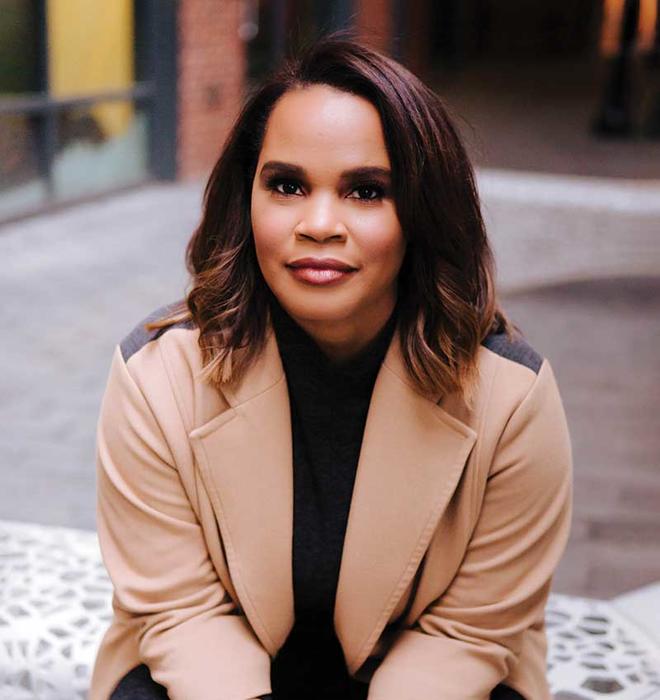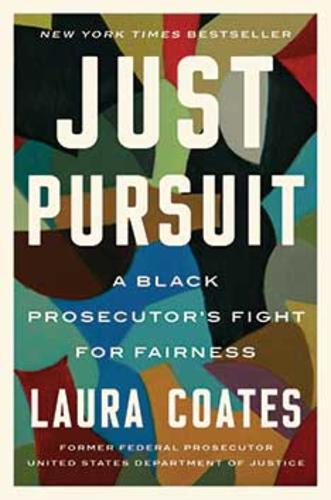
Her Seat at the Table
A new book by Laura Coates ’01 recounts injustices in our justice system
Laura Coates ’01 has traveled a winding path from her early work as a lawyer and prosecutor to her current career as a prominent legal analyst and fill-in prime-time anchor on CNN. But in hindsight, she says, there should have been a clue in her Princeton application interview 25 years ago, when she was asked what she liked to do for fun. Her answer: Write speeches summing up what she would have said at moments in history, “if I were in charge of the world.”
“For me, the connective tissue throughout my entire life has been storytelling, and being able to share the stories that I think need to be told,” Coates said when PAW caught up with her by telephone at her home outside Washington, D.C., in February. “I look at the overall arc and perhaps I should have seen this all along in the foreshadowing. But even now I smile at the chutzpah of that 16-year-old saying, ‘Here’s what I would have said differently.’ ’’
These days, Coates gets the chance to have her say most weeknights to a national television audience, and on her daily Laura Coates Show on SiriusXM Satellite Radio’s POTUS channel, whether she’s discussing the legal travails of former President Donald Trump, the latest case of police misconduct, the political ramifications of voter-suppression laws, or the constitutional threat of the Jan. 6 attack on the U.S. Capitol. It’s a privilege she doesn’t take lightly.
“In some respects, I still practice law in the work that I do by presenting information,” she says. “But in the law, we tend to persuade. In journalism, we present the facts and hope that the horse is led to water, but we don’t make it drink.”
Rebecca Kutler, a CNN senior vice president and its head of contributors, who hired Coates in 2016, notes that “a lot of people are fantastic doctors or lawyers or law-enforcement officers, but that doesn’t mean they can necessarily make the switch and take on a whole new career.” Coates’ “superpower,” Kutler says, “is the ability to take very complex legal issues and make me understand them, make the audience understand them.”
Coates has also used her explanatory skills to write two books: a 2016 bestseller, You Have The Right: A Constitutional Guide to Policing the Police (Karen Hunter Digital), and the recently published Just Pursuit: A Black Prosecutor’s Fight for Fairness (Simon & Schuster). The latest is a collection of tales from the trenches of her time as an assistant U.S. Attorney in the District of Columbia, prosecuting a wide range of violent offenses. Neither a legal textbook nor a conventional memoir, the book is a gritty and moving reflection of the reality that “the pursuit of justice can create injustice,” as Coates said at a virtual book talk for the Association of Black Princeton Alumni (ABPA) in January.
In novelistic detail, Just Pursuit recounts Coates’ ambivalence as a comparatively rare Black prosecutor in a justice system that overwhelmingly charged Black defendants and often produced morally muddied outcomes. “There were moments of triumph and humanity,” Coates said in the ABPA talk, but also trauma and heartbreak that kept her awake at night — like Coates’ refusal to ask for leniency for a 20-year-old car thief, despite the sympathetic pleas of his victim, an older Black woman, that he be spared jail time. Coates knew she had to preserve her credibility with the judge so that she would be able to ask for leniency where it might be merited in future cases, without such a forgiving victim.
After years navigating such messy compromises, Coates had to decide whether it was better to serve the justice system from within or from the outside, where she could “use activism in the form of education and information,” as she put it in the ABPA talk. “And for me, I resolved that the latter was more important.” So she struck out on a media career, explaining, “I have really benefited from a sense of restlessness, of not answering the question of what you want to be when you grow up with one answer.”
Coates grew up in St. Paul, Minnesota. Her father, who spent most of his childhood in foster care, graduated from Amherst and became a dentist; her mother, the daughter of domestic workers, went to Smith and is now a banker for Wells Fargo. Her two older sisters also went to Smith and Amherst, but Princeton was always Coates’ first choice, and as a standout student at the private St. Paul Academy, she had options. She was attracted by the public affairs curriculum of what was then the Woodrow Wilson School. “To me, that school was illustrative of a sort of intersectionality that I always wanted — how they intersected, politics, history, and sociology,” she says. She wrote her senior thesis on voting-rights restoration for former felons, though the school nixed her idea for an accompanying documentary film that would have required her to interview prisoners.
Coates didn’t pursue journalism in college, but two of her most influential Princeton teachers came from journalistic backgrounds: Nat Hentoff, the veteran jazz critic and civil libertarian who was a visiting Ferris professor, and Phil Schaap, the eclectic New York jazz disc jockey who taught American studies and music. “I would talk with him for hours about his radio career,” Coates recalls.
At Princeton, Coates was president of the campus chapter of the National Council of Negro Women and co-president of the Organization for Black Unity. She was also a member of Cap and Gown. She says she “really enjoyed” her Princeton experience, though she adds, “Of course, there were moments where the level of enlightenment varied, depending on the situation you were in.” She notes that while some Black students were ambivalent about the eating clubs, “There was also this idea of what would be the point of going to Princeton — it would be difficult to compartmentalize what aspects of elitism you partook in.” She says she and her classmates were determined “in trying to be disruptive and have a seat at the table, and to be able to partake of all aspects of Princeton and experience what that meant.”
After graduation from the University of Minnesota Law School, Coates worked in private practice in intellectual property and media law in Minneapolis and New York. But by 2008, she felt a call to public service and joined the civil-rights division of the Justice Department, working in voting-rights enforcement. In 2011, she transferred to the D.C. U.S. Attorney’s Office, where because of the unusual nature of the city’s government, her duties were akin to those of an assistant district attorney in New York or Los Angeles. From the beginning she was struck by the reality that fairness is so often lacking in the criminal process that justice remains more aspirational than actual. She kept detailed journals “mostly as a form of therapy” on the theory that “if I can write it down, perhaps it can get out of my subconscious and I can get it into a place where it doesn’t haunt me.”
Eventually, the grind of the job wore her down and she decided to pursue a writing career, taking her laptop to a neighborhood Panera Bread café. She knew no one in media or journalism but reached out through TigerNet to fellow Princetonians. She published her first op-ed piece in the Cleveland Plain Dealer in 2015. Guest shots on radio and on MSNBC and CNN followed, eventually leading to her Sirius show and her regular CNN gig as an analyst and substitute anchor for Don Lemon Tonight and other programs.
“What choice do we have? At what points in American history did us conceding defeat actually lead to progress? We cannot become accustomed to throwing our hands up and saying, ‘It’s hard.’ ” — Laura coates ’01
She often broadcasts from a fully outfitted studio at the home in Northern Virginia that she shares with her husband, Dale Gordon, an IT engineer, and their son, Adrian, 9, and daughter, Sydney, 7. She built the studio before the COVID-19 pandemic when she realized she wasn’t at home enough with her kids. When Coates was writing her latest book and found herself weeping, she recalls, her daughter, knowing how the prosecutor’s job had affected her, would say, “I think Mommy’s remembering again.”
Coates’ CNN Colleague Dana Bash describes her as the sort of demon multitasker who can cover the news and lead her daughter’s Girl Scout troop, squeezing a sales pitch for cookies into a busy workday. “Talking in the green room and in the makeup chair, I quickly got to know not only how smart she is but how down-to-earth she is,” Bash says. “She’s just a girl’s girl and a professional’s professional. She’s equal parts.” In an on-air debate, Bash notes, Coates can “take somebody down and you don’t even know what hit you. She does it with a velvet, rose-colored scalpel as opposed to a bludgeon. You don’t even understand that your point got completely destroyed. She’s not doing it to destroy them; she’s doing it to correct the record.”
At the same time, says the veteran CNN anchor Wolf Blitzer, the unblinking television camera captures a kindness that cannot be faked. “She’s extremely nice, and I think that comes through,” he says. “We get really positive feedback from viewers whenever she’s on my show and when she’s hosting.” CNN’s Kutler predicts that Coates has a bright future in TV. “Laura is somebody — and this is a cliché, so I apologize — but someone who can do almost anything she puts her mind to,” she says. “It’s very, very difficult to do what she’s doing and make it look as easy as she does.”
Coates says she would leap at a full-time anchor position if one were offered. “Of course,” she says. “I would be a fool not to honor the power of that platform.” As she noted in her ABPA talk, she believes it’s important for Black people to have a seat at every table, not just as defense lawyers but as prosecutors and members of political institutions from school boards and water districts to Congress and the White House. And she remains resolute in her belief in the country’s capacity for change. Asked on the ABPA call if she thinks the criminal-justice system can ever be reformed, her answer was crisp: “What choice do we have? At what points in American history did us conceding defeat actually lead to progress? We cannot become accustomed to throwing our hands up and saying, ‘It’s hard.’ ”
Longtime journalist Todd S. Purdum ’82 is the author, most recently, of Something Wonderful: Rodgers and Hammerstein’s Broadway Revolution.







1 Response
Pamela Nickolas-Simpson
2 Weeks AgoThank You for Your Work
Thank you, Laura. I am so very proud of the work you and Abby and the rest of the CNN team are doing. I love your professionalism — both of you beautiful ladies make me proud and are absolutely a positive influence to all young people seeking a future in the field of journalism and news reporting.